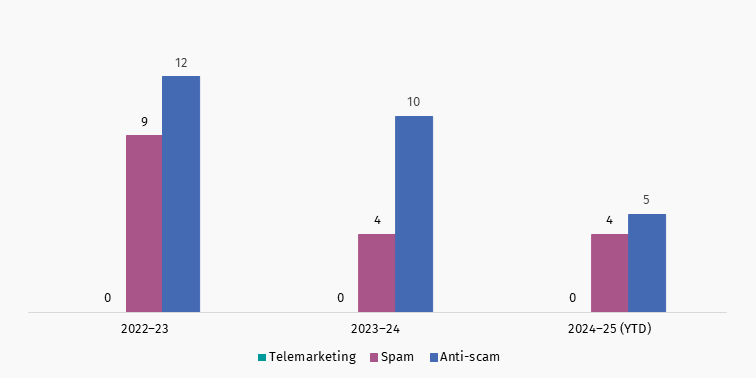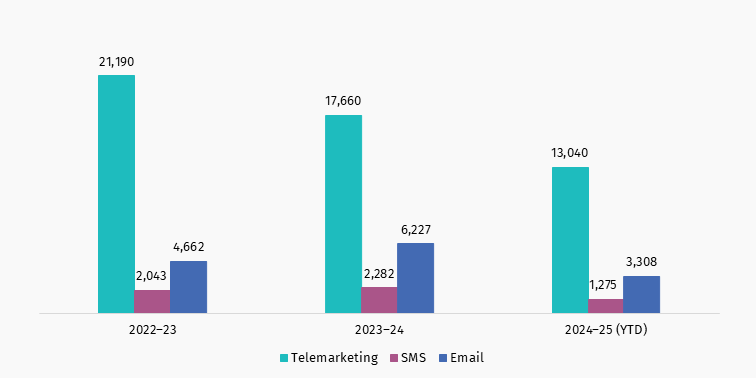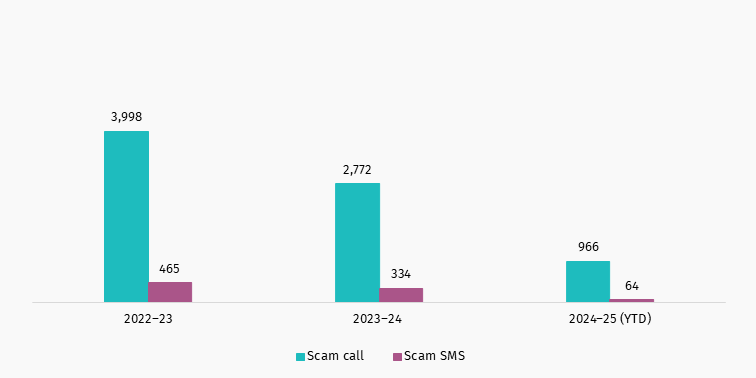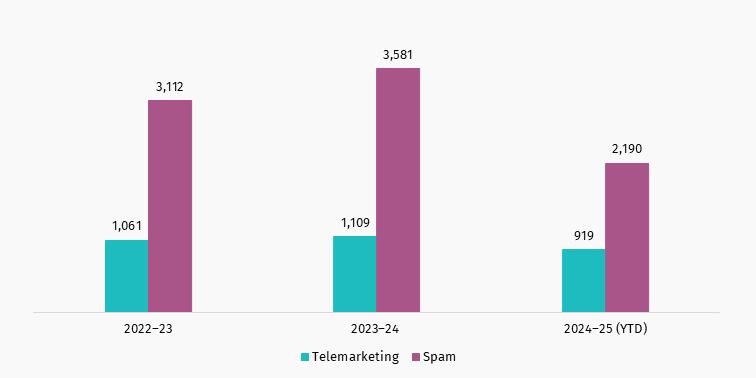Our key actions |
|
 |
Federal Court imposed penalties totalling $1,500,000 against V Marketing and $60,000 against its sole director for telemarketing law breaches. |
 |
Received reports that telcos have blocked more than 2.4 billion scam calls and 897.3 million scam SMS. |
 |
Gave 945 compliance alerts to businesses about alleged non-compliance to enable prompt resolution of issues. |
* You can obtain the accessibility information for the graphs in this report from the file at the bottom of this page.
Our 2024–25 priorities
We have 2 compliance priorities for the 2024–25 financial year for unsolicited communications and scams:
- Targeting misleading spam messages – Our priority is to enforce spam rules to stop commercial messages being misleadingly sent as ‘service’ or non-commercial messages.
- Disrupting SMS impersonation scams – We will work to disrupt the distribution and impact of these scams by:
- enforcing rules that telcos need to follow to identify and prevent SMS scams
- sharing intelligence with fellow regulators in Australia and internationally.
Spam and telemarketing enforcement
Key actions and outcomes include:
- The Federal Court imposed penalties totalling $1,500,000 against V Marketing, as well as ordering its sole director, Michael Vazquez, to pay $60,000 following an ACMA investigation into telemarketing law contraventions. These contraventions relate to over one million telemarketing calls made by V Marketing to numbers on the Do Not Call Register, across 2 periods between 1 March 2017 and 27 September 2018.
- We announced the payment of a $626,000 penalty by Telstra after we investigated and found it sent close to 10.5 million SMS over a 21-month period from 2022–24 that did not comply with spam laws. This included more than 10.3 million SMS that required recipients to provide personal information to opt out. A further 43,228 SMS were sent to customers of Telstra’s ‘Belong’ brand who had either not consented to receive these messages or had withdrawn their consent.
- We also accepted a court-enforceable undertaking from Telstra committing it to an independent review of its electronic marketing practices. This includes implementation of improvements and providing appropriate resources and governance to ensure compliance.
Disrupting SMS impersonation scams
Key actions and outcomes include:
- Telcos reported blocking more than 897.3 million scam SMS since July 2022, to the end of this quarter. The ACMA and telcos use blocking statistics to identify trends and inform disruption activities.
- We consulted on new regulatory arrangements to support the implementation of a mandatory SMS Sender ID Register. This will help prevent business SMS headers from being impersonated by scammers. It will also restore consumer confidence that the brand identified in an SMS is legitimate and can be trusted.
- We provided the voluntary pilot Sender ID Register. This is disrupting SMS impersonation scams involving some of the key brands used in scam communications.
- We issued a consumer alert about banking impersonation scams.
Other scam disruption activities
Key actions and outcomes include:
- Telcos reported blocking more than 2.4 billion scam calls since December 2020, to the end of this quarter. The ACMA and telcos use blocking statistics to identify trends and inform disruption activities.
- We commenced engagement with industry on potential initiatives that would require telcos to uplift existing Know Your Customer and Know Your Traffic obligations to prevent scams.
- We gave anonymised scam call data to telcos to inform their blocking activities.
- We issued a consumer alert about LinkedIn scam emails.
- We collaborated with the National Anti-Scam Centre to share information on scam trends and align educational material for consumers.
- We worked alongside telcos, government agencies, international regulators and big brands to disrupt phone scams by providing data and information.
Key compliance issue: Protecting customers from mobile number fraud
Mobile number fraud occurs when a person’s service is compromised by being transferred to a scammer, who can use the mobile number to access financial or other information.
Under the Telecommunications (Mobile Number Pre-Porting Additional Identity Verification) Industry Standard 2020 and the Telecommunications Service Provider (Customer Identity Authentication) Determination 2022, telcos must generally use multi-factor authentication checks to confirm a mobile number port or that an account access request is being made by an unauthorised person.
What telcos need to do:
- Follow the rules and make sure your systems are secure.
- Regularly test for vulnerabilities that could be exploited.
What consumers can do:
- Stay alert: Scammers may impersonate your telco to trick you into giving verification codes. If unsure, hang up and call your provider on a publicly listed number.
- Protect personal info: Avoid sharing your birthday or phone number on social media.
- Secure your physical mailbox: Many scams start with stolen mail.
- Use strong, unique passwords: Check if your passwords have been compromised at a service like haveibeenpwned.com.
- Act fast if something feels off: If your mobile stops working (except for SOS calls) or you receive an unexpected message from your telco, immediately contact your bank and telco.
These rules have prevented major financial losses and identity theft for Australians. However, the threat is ongoing. We are investigating weaknesses in telco systems and will take enforcement action where we find non-compliance.
Investigations and enforcement
At the end of this quarter, we have:
- opened 2 investigations
- finalised 4 investigations
- progressed 4 investigations
- monitored compliance with 21 court-enforceable undertakings in force.
For the 12 months to the end of the quarter, we took an average of 4.3 months to complete an investigation. All investigations were completed within 6 months.
View our enforcement actions for breaches of spam and telemarketing laws.
View our enforcement actions for breaches of scam laws.
Finalised investigations

Complaints
In this quarter:
- we received more than 5,700 complaints from consumers about alleged breaches of telemarketing and spam laws
- retail, solar and financial services were the most complained about industries
- scams made up 8% of the complaints we received (12.6% of spam complaints and 6.9% of telemarketing complaints).
Complaints received by financial year

Note: We have received 35 complaints about commercial instant messages so far in 2024–25.
Complaints received about scam calls and SMS

Note: These are a subset of all complaints received by financial year.
Compliance alerts
Where we receive enough information to identify the alleged caller or sender, we alert businesses about potential compliance issues raised in complaints. One alert can relate to several issues or complaints.
Compliance alerts given to businesses

More information
Find out more about scam, spam and telemarketing rules, including how to make a complaint.
Subscribe to our newsletters to get updates about our actions on scams, spam and telemarketing.
